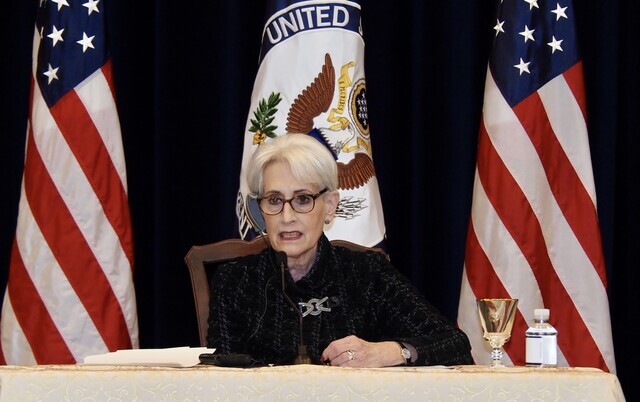hankyoreh
Links to other country sites 다른 나라 사이트 링크
Joint S. Korea-US-Japan press conference falls through after S. Korean police commissioner visits Dokdo

A joint press conference by South Korean, US, and Japanese vice foreign ministers that was scheduled to take place at the Department of State in Washington, DC, on Wednesday afternoon was abruptly canceled and replaced with a press availability by the US deputy secretary of state.
The cancellation reportedly came after Japan sternly protested a visit to Dokdo on Tuesday by Korean National Police Agency Commissioner General Kim Chang-yong.
South Korean First Vice Minister of Foreign Affairs Choi Jong-kun, US Deputy Secretary of State Wendy Sherman, and Japanese Vice Minister for Foreign Affairs Takeo Mori were originally scheduled to hold a joint press conference at 2 pm following their trilateral meeting at the US State Department building on Wednesday. Reporters from all three countries sent a joint press corps to the venue in response to a prior announcement.
But a little over an hour before the conference, the South Korean press corps received word that it would be given by Sherman alone. The US reportedly provided the notification by way of the South Korean Embassy in Washington.
Indeed, Sherman was alone when she appeared at the press area at 2 pm.
“As has been the case for some time, there are some bilateral differences between Japan and the Republic of Korea that are continuing to be resolved,” she said.
“One of those differences which is unrelated to today’s meeting has led to the change in format for today’s press availability,” she added.
Stating that the decision not to hold a joint press conference was unrelated to the meeting that day, Sherman also emphasized that the three sides had “had a very constructive trilateral meeting today.”
The specific reason for the joint press conference’s cancellation was not immediately made public. But sources reported that it had to do with vehement protests by the Japanese government over a visit to Dokdo by Korea’s police Commissioner General Kim Chang-yong.
Kim had paid a visit to Dokdo on Tuesday to review the situation there and offer encouragement to security workers on the islets. In response, Japanese Chief Cabinet Secretary Hirokazu Matsuno shared a message of stern protest to the South Korean government during a press conference.
“If it is true that [Kim] landed [on Dokdo], then that is utterly unacceptable and extremely regrettable,” he said.
The trilateral meeting among the South Korean, US, and Japanese vice foreign ministers that day was the first in four months, the last being in July. The occasion was intended to promote stronger cooperation on global and Indo-Pacific issues, including the Korean Peninsula peace process and a declaration officially ending the Korean War.
But the flare-up of deep-seated distrust and conflict between South Korea and Japan over historical and territorial issues put a damper on the mood of trilateral cooperation.
When asked about Seoul and Washington’s discussions of an end-of-war declaration during the press availability Wednesday, Sherman said the US was “very satisfied with the consultations we are having both with the Republic of Korea and with Japan, and with other allies and partners.”
“I look forward to those continued consultations,” she added.
When asked about whether differences between South Korea and Japan over the end-of-war declaration idea had been resolved, she repeated that the US was coordinating with both countries.
“I think that whenever we all consult and coordinate with each other, we always come out with a good result that ensures the interests of each of our countries and the overall interest of the world in peace and security,” she said.
Commenting on the end-of-war declaration issue to reporters upon his arrival in Washington on Sunday, Choi said, “I think we’ll have a positive outcome pretty soon.”
Sherman did not share an immediate response when asked about this.
By Hwang Joon-bum, Washington Correspondent
Please direct questions or comments to [english@hani.co.kr]

Editorial・opinion
![[Column] Life on our Trisolaris [Column] Life on our Trisolaris](https://flexible.img.hani.co.kr/flexible/normal/500/300/imgdb/original/2024/0505/4817148682278544.jpg) [Column] Life on our Trisolaris
[Column] Life on our Trisolaris![[Editorial] Penalties for airing allegations against Korea’s first lady endanger free press [Editorial] Penalties for airing allegations against Korea’s first lady endanger free press](https://flexible.img.hani.co.kr/flexible/normal/500/300/imgdb/original/2024/0502/1817146398095106.jpg) [Editorial] Penalties for airing allegations against Korea’s first lady endanger free press
[Editorial] Penalties for airing allegations against Korea’s first lady endanger free press- [Editorial] Yoon must halt procurement of SM-3 interceptor missiles
- [Guest essay] Maybe Korea’s rapid population decline is an opportunity, not a crisis
- [Column] Can Yoon steer diplomacy with Russia, China back on track?
- [Column] Season 2 of special prosecutor probe may be coming to Korea soon
- [Column] Park Geun-hye déjà vu in Yoon Suk-yeol
- [Editorial] New weight of N. Korea’s nuclear threats makes dialogue all the more urgent
- [Guest essay] The real reason Korea’s new right wants to dub Rhee a founding father
- [Column] ‘Choson’: Is it time we start referring to N. Korea in its own terms?
Most viewed articles
- 1New sex-ed guidelines forbid teaching about homosexuality
- 260% of young Koreans see no need to have kids after marriage
- 3[Column] Life on our Trisolaris
- 4OECD upgrades Korea’s growth forecast from 2.2% to 2.6%
- 5Presidential office warns of veto in response to opposition passing special counsel probe act
- 6Months and months of overdue wages are pushing migrant workers in Korea into debt
- 7[Guest essay] Maybe Korea’s rapid population decline is an opportunity, not a crisis
- 8Trump asks why US would defend Korea, hints at hiking Seoul’s defense cost burden
- 9[Editorial] Penalties for airing allegations against Korea’s first lady endanger free press
- 10Japan says it’s not pressuring Naver to sell Line, but Korean insiders say otherwise